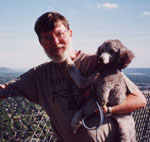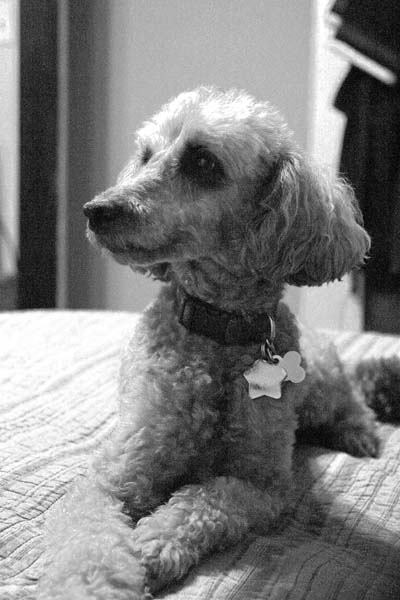 We met in midsummer 2001. He was barely six months old but already silver, deep-chested, long-legged, gregarious poodle, the smartest and most sensitive dog I have ever known. Here is how we looked back then. Two days ago we put him to rest in order to circumvent a cruel and painful death of another kind. A vicious tumor had undermined his lower jaw. He would have been fourteen this December. We called him Murphy.
We met in midsummer 2001. He was barely six months old but already silver, deep-chested, long-legged, gregarious poodle, the smartest and most sensitive dog I have ever known. Here is how we looked back then. Two days ago we put him to rest in order to circumvent a cruel and painful death of another kind. A vicious tumor had undermined his lower jaw. He would have been fourteen this December. We called him Murphy.
All deaths are significant, those of animals (beloved or not) no less than those of humans. The fact of death is most commonly present to us as the loss of a single creature out of the aggregate of those present to us. It is this singleness that most discloses to us the mystery of the abundance of God, at whose heart is the blink of an eye and a vanishing. Murphy died in Kathleen’s arms without struggle and apparently without pain. It was as though a wind passed over him and he was gone.
He came to be called Murphy by an agreement of sorts. Kathleen had lost another beloved dog in early 2001. At that point in our relationship we commuted back and forth across the distance between Iowa City, where Kathleen was a professor at the University, and Denton, Texas, where I was beginning my final year of service before retirement from UNT. We planned marriage but had not yet done the deed.
 Kathleen called me from a conference in Washington D. C. in late May that year to tell me that she had found a new dog. She described him to me and asked, “Can I keep him?” The question was pro forma, and I knew it. We were pretty sure of one another then. So I answered her question with a question. “What’s his name?” I asked. “Murphy,” she replied. He has been my constant companion since we all moved in together in late August, 2002. Here’s one of my favorite pictures of him perched on the bed in our bedroom.
Kathleen called me from a conference in Washington D. C. in late May that year to tell me that she had found a new dog. She described him to me and asked, “Can I keep him?” The question was pro forma, and I knew it. We were pretty sure of one another then. So I answered her question with a question. “What’s his name?” I asked. “Murphy,” she replied. He has been my constant companion since we all moved in together in late August, 2002. Here’s one of my favorite pictures of him perched on the bed in our bedroom.
Murphy had failed at the dog show game. His legs were too long. He had raccoon eyes. But he was built like a whippet and could run like one too. Besides a walk he had three gaits. He could leap into a full-out sprint off the back porch to chase a squirrel. He never caught one, but I was pretty sure he could have done but that the short distance between the porch and the back fence in our tiny city backyard didn’t allow him to get quite up to speed.
He had a jaunty, devil-may-care trot too, that he usually adopted on the leash, but he revealed his true nature when he had a big space to run in. Our friend, Leslie, has a large (and beautiful) backyard in Iowa City, a bit like a second home to us and to Murphy. Countless times I have watched him, when we would arrive for a visit, sprint down the two-story back stairs with an abandon almost painful to see and race around and around Leslie’s yard, running by the fence at the perimeter, quickly settling into a long, soaring lope that he seemed to be able to continue almost indefinitely.
I shall not lack for good memories of Murphy to stand against the memory of the last illness that sapped his life. Among them will be the memory of his bony back against mine in the bed at night and the way he worked the room when we had guests. But since he has now entered the realm of my memories and those of others who knew him and with whom he shared his life, there is another sort of memory I want to memorialize.
We are told that dogs study us; study, particularly, our faces. I have watched Murphy study me for a sum of hours over the years and thought I could see in those raccoon eyes a thing worth my study as well. I speak now not of a study like the study of books or languages or science, but of something far more profound and unsentimental. Here are some lines about it that I found in Rilke’s Eighth Duino Elegy and made into a poem for him at the time I first realized Murphy had joined me in the community of aging. I close with them.
For Murphy, Growing Old
With all its eyes creation sees
an open space. Only our eyes invert,
entrap, surround free beings as they emerge.
What is outside, we know only from the gaze
of animals; already as young children we are
turned around, constrained to see backwards
to live among objects not in the open, which
in animal faces is so deep. Free from death
(only we see that) the animal has its demise
continually behind it and God before, perhaps—
the movement of its being wells up like a spring,
already in eternity.
after Rilke
Murphy Farrell/Long (December 12, 2000—July 28, 2014) RIP.
